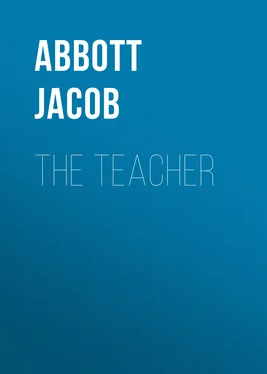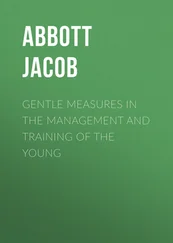Jacob Abbott - The Teacher
Здесь есть возможность читать онлайн «Jacob Abbott - The Teacher» — ознакомительный отрывок электронной книги совершенно бесплатно, а после прочтения отрывка купить полную версию. В некоторых случаях можно слушать аудио, скачать через торрент в формате fb2 и присутствует краткое содержание. Жанр: foreign_edu, pedagogy_book, на английском языке. Описание произведения, (предисловие) а так же отзывы посетителей доступны на портале библиотеки ЛибКат.
- Название:The Teacher
- Автор:
- Жанр:
- Год:неизвестен
- ISBN:нет данных
- Рейтинг книги:5 / 5. Голосов: 1
-
Избранное:Добавить в избранное
- Отзывы:
-
Ваша оценка:
- 100
- 1
- 2
- 3
- 4
- 5
The Teacher: краткое содержание, описание и аннотация
Предлагаем к чтению аннотацию, описание, краткое содержание или предисловие (зависит от того, что написал сам автор книги «The Teacher»). Если вы не нашли необходимую информацию о книге — напишите в комментариях, мы постараемся отыскать её.
The Teacher — читать онлайн ознакомительный отрывок
Ниже представлен текст книги, разбитый по страницам. Система сохранения места последней прочитанной страницы, позволяет с удобством читать онлайн бесплатно книгу «The Teacher», без необходимости каждый раз заново искать на чём Вы остановились. Поставьте закладку, и сможете в любой момент перейти на страницу, на которой закончили чтение.
Интервал:
Закладка:
In the case supposed, the teacher concluded to appeal to emulation. While I describe the measure he adopted, let it be remembered that I am now only approving of the resort to ingenuity and invention, and the employment of moral and intellectual means, for the accomplishment of his purposes, and not of the measures themselves. I do not think the plan I am going to describe a wise one; but I do think that the teacher, while trying it, must have been interested in his intellectual experiment . His business, while pursued in such a way, could not have been a mere dull and uninteresting routine.
He purchased, for three cents apiece, two long lead-pencils, an article of great value, in the opinion of the boys of country schools; and he offered them, as prizes, to the boy who would write most carefully; not to the one who should write best , but to the one whose book should exhibit most appearance of effort and care for a week. After announcing his plan, he watched, with strong interest its operation. He walked round the room while the writing was in progress, to observe the effect of his measure. He did not reprove those who were writing carelessly; he simply noticed who and how many they were. He did not commend those who were evidently making effort; he noticed who and how many they were, that he might understand how far, and upon what sort of minds, his experiment was successful, and where it failed. He was taking a lesson in human nature,—human nature as it exhibits itself in boys, and was preparing to operate more and more powerfully by future plans.
The lesson which he learned by the experiment was this, that one or two prizes will not influence the majority of a large school. A few seemed to think that the pencils were possibly within their reach, and they made vigorous efforts to secure them; but the rest wrote on as before. Thinking it certain that they should be surpassed by the others, they gave up the contest, at once, in despair.
The obvious remedy was to multiply his prizes, so as to bring one within the reach of all. He reflected too that the real prize, in such a case, is not the value of the pencil, but the honor of the victory ; and as the honor of the victory might as well be coupled with an object of less, as well as with one of greater value, the next week he divided his two pencils into quarters, and offered to his pupils eight prizes instead of two. He offered one to every five scholars, as they sat on their benches, and every boy then saw, that a reward would certainly come within five of him. His chance, accordingly, instead of being one in twenty, became one in five.
Now is it possible for a teacher, after having philosophized upon the nature of the minds upon which he is operating, and surveyed the field, and ingeniously formed a plan, which plan he hopes will, through his own intrinsic power, produce certain effects,—is it possible for him when he comes, for the first day, to witness its operations, to come without feeling a strong interest in the result? It is impossible. After having formed such a plan, and made such arrangements, he will look forward, almost with impatience, to the next writing hour. He wishes to see whether he has estimated the mental capacities and tendencies of his little community aright; and when the time comes, and he surveys the scene, and observes the operation of his measure, and sees many more are reached by it, than were influenced before, he feels a strong gratification; and it is a gratification which is founded upon the noblest principles of our nature. He is tracing on a most interesting field, the operation of cause and effect. From being the mere drudge, who drives, without intellect or thought, a score or two of boys to their daily tasks, he rises to the rank of an intellectual philosopher, exploring the laws and successfully controlling the tendencies of mind.
It will be observed too, that all the time this teacher was performing these experiments, and watching, with intense interest, the results, his pupils were going on undisturbed in their pursuits. The exercises in writing were not interrupted or deranged. This is a point of fundamental importance; for, if what I should say on the subject of exercising ingenuity and contrivance in teaching, should be the means, in any case, of leading a teacher to break in upon the regular duties of his school, and destroy the steady uniformity with which the great objects of such an institution should be pursued, my remarks had better never have been written. There may be variety in methods and plan; but through all this variety, the school, and every individual pupil of it, must go steadily forward in the acquisition of that knowledge which is of greatest importance in the business of future life. In other words, the variations and changes, admitted by the teacher, ought to be mainly confined to the modes of accomplishing those permanent objects to which all the exercises and arrangements of the school ought steadily to aim. More on this subject however in another chapter.
I will mention one other circumstance, which will help to explain the difference in interest and pleasure with which teachers engage in their work. I mean the different views they take of the offences of their pupils . One class of teachers seem never to make it a part of their calculation that their pupils will do wrong, and when any misconduct occurs, they are disconcerted and irritated, and look and act as if some unexpected occurrence had broken in upon their plans. Others understand and consider all this beforehand. They seem to think a little, before they go into their school, what sort of beings boys and girls are, and any ordinary case of youthful delinquency or dulness does not surprise them. I do not mean that they treat such cases with indifference or neglect, but that they expect them, and are prepared for them . Such a teacher knows that boys and girls, are the materials he has to work upon, and he takes care to make himself acquainted with these materials, just as they are . The other class however, do not seem to know at all, what sort of beings they have to deal with, or if they know, do not consider . They expect from them what is not to be obtained, and then are disappointed and vexed at the failure. It is as if a carpenter should attempt to support an entablature by pillars of wood too small and weak for the weight, and then go on, from week to week, suffering anxiety and irritation, as he sees them swelling and splitting under the burden, and finding fault with the wood , instead of taking it to himself.
It is, of course, one essential part of a man's duty in engaging in any undertaking, whether it will lead him to act upon matter or upon mind, to become first well acquainted with the circumstances of the case,—the materials he is to act upon, and the means which he may reasonably expect to have at his command. If he underrates his difficulties, or overrates the power of his means of overcoming them, it is his mistake; a mistake for which he is fully responsible. Whatever may be the nature of the effect which he aims at accomplishing, he ought fully to understand it, and to appreciate justly the difficulties which lie in the way.
Teachers however very often overlook this. A man comes home from his school at night, perplexed and irritated by the petty misconduct which he has witnessed, and been trying to check. He does not however, look forward and try to prevent the occasions of it, adapting his measures to the nature of the material upon which he has to operate; but he stands like the carpenter at his columns, making himself miserable in looking at it, after it occurs, and wondering what to do.
"Sir," we might say to him, "what is the matter?"
"Why, I have such boys, I can do nothing with them. Were it not for their misconduct , I might have a very good school."
Читать дальшеИнтервал:
Закладка:
Похожие книги на «The Teacher»
Представляем Вашему вниманию похожие книги на «The Teacher» списком для выбора. Мы отобрали схожую по названию и смыслу литературу в надежде предоставить читателям больше вариантов отыскать новые, интересные, ещё непрочитанные произведения.
Обсуждение, отзывы о книге «The Teacher» и просто собственные мнения читателей. Оставьте ваши комментарии, напишите, что Вы думаете о произведении, его смысле или главных героях. Укажите что конкретно понравилось, а что нет, и почему Вы так считаете.












